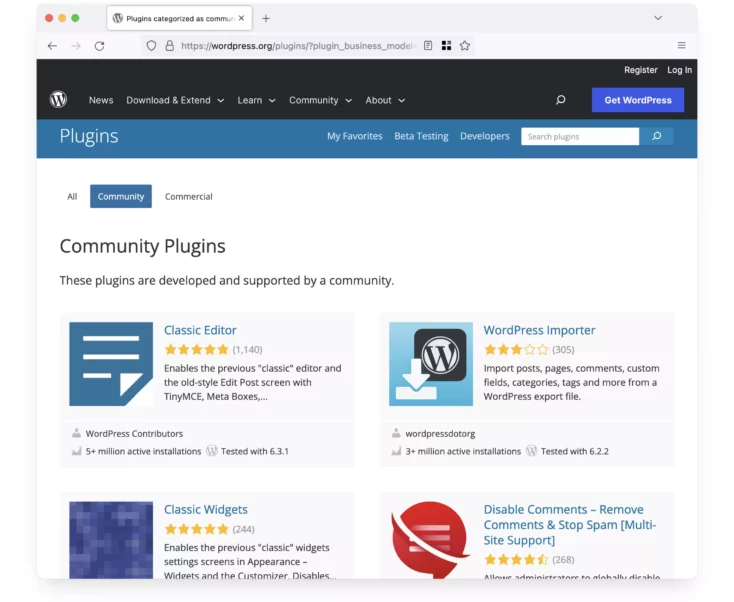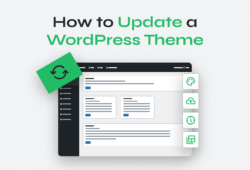
Building your website is an exciting journey, but with thousands of WordPress themes available, choosing the right one can feel overwhelming. Your theme affects not just the look, but also the usability, performance, and SEO of your site.
This guide will teach you how to choose a WordPress theme that meets your needs, providing key strategies and considerations to simplify the selection process. Discover the best fit for your website!
Table of Contents
- Understanding Your Website Needs
- Key Factors to Consider When Choosing a WordPress Theme
- Advanced Features to Look for in a WordPress Theme
- Evaluating Themes
- Free Vs Premium Themes
- Where to Find WordPress Themes
- Recommended WordPress Themes
Understanding Your Website Needs
Before you start browsing through thousands of WordPress themes, it’s crucial to understand the specific needs of your website. Identifying your niche, defining your website’s purpose, knowing your target audience, determining the necessary features, and setting a budget will help narrow down your options and ensure you choose a theme that aligns perfectly with your goals.
1. Identify Your Website’s Niche
Understanding the niche of your website is the first step. Whether you’re creating a blog, an online store, a portfolio, or a corporate site, knowing your specific market or subject area will guide you towards themes that not only look good but also serve your functional needs. For example, a photography portfolio site will have different requirements than an e-commerce store.
2. Define the Purpose and Target Audience
Define the main purpose of your website. Are you looking to inform, entertain, sell products, or showcase your work? This purpose will significantly influence the type of theme you should choose. Additionally, understanding your target audience’s needs, preferences, and behaviors will help in selecting a theme that appeals to them, ensuring your website attracts and retains visitors.
3. Determine Required Features and Functionalities
List the features and functionalities your website needs. Do you require a blog section, an online store, a booking system, or a gallery? Knowing the essential features beforehand will help you eliminate themes that don’t meet your requirements. Make sure the theme supports all necessary functionalities either natively or through compatible plugins.
4. Set Your Budget
WordPress offers a vast selection of both free and premium themes. Determining your budget beforehand helps refine your search to themes that offer the best value for your investment. While free themes are budget-friendly, premium themes often come with more advanced features, better support, and regular updates.
Key Factors to Consider When Choosing a WordPress Theme
Selecting the right WordPress theme involves evaluating several important factors to ensure it meets your specific needs. This section will guide you through the essential aspects to consider, from design aesthetics to user reviews and more.
1. Design Aesthetics
The visual appeal of your website plays a crucial role in attracting and retaining visitors. Choose a theme with design aesthetics that align with your brand’s identity and message. Pay attention to color schemes, typography, layout, and imagery to ensure they create a cohesive and attractive look. Remember, a theme should not only be visually pleasing but also user-friendly.

2. Mobile-Readiness and Responsiveness
Most users access websites from their mobile devices. Therefore, it’s essential to choose a WordPress theme that is mobile-ready and responsive. A responsive theme automatically adjusts to fit any screen size, providing an optimal user experience across desktops, tablets, and smartphones. This enhances user engagement and helps retain visitors.

3. Customization Options
A theme that offers extensive customization options allows you to tailor the website to your specific needs without extensive coding knowledge. Look for themes that enable you to easily change colors, font styles, and layout structures. Additionally, ensure that the theme supports custom CSS edits for further customization. The ability to modify the theme easily ensures it matches your brand’s look and feel.

4. SEO Friendliness
Search engine optimization (SEO) is critical for your website’s visibility. Ensure that the WordPress theme you choose is SEO-friendly. A theme with clean, optimized code and support for SEO plugins like Yoast SEO or Rank Math can enhance your site’s search engine rankings. Features like metadata optimization, fast loading times, and a user-friendly backend are also important for good SEO performance.

5. Performance and Speed
Website performance and speed are crucial for providing a smooth user experience. A poorly performing theme can slow down your site, leading to higher bounce rates and lower user engagement. Choose a theme that is optimized for speed, with clean, efficient code. Check reviews and demo sites to ensure the theme loads quickly and runs smoothly.

Advanced Features to Look for in a WordPress Theme
1. Essential Plugins Compatibility
Plugins extend your website’s functionality, so it’s important to choose a theme that is compatible with essential WordPress plugins. Verify that the theme supports popular plugins like WooCommerce for e-commerce, TranslatePress for multilingual support, and major SEO plugins. Compatibility ensures your site can leverage these tools effectively.

2. Translation Ready Themes
If you aim to reach a global audience, consider whether the theme is translation-ready. A theme with multilingual support ensures your content is accessible to users in different languages. Check if the theme supports translation plugins like TranslatePress, WPML or Polylang . This feature is vital for international outreach and improving user experience.
3. E-commerce Support
For online stores, e-commerce support is a must. Ensure the theme integrates seamlessly with e-commerce plugins like WooCommerce and offers features such as shopping carts, product displays, and secure payment gateways. Reviewing the theme’s demo can provide insights into its e-commerce functionality and user experience.

4. Cross-Browser and Multi-Device Compatibility
Your website should perform consistently across various browsers and devices. Choose a theme that is tested for cross-browser compatibility and works well on all major browsers like Chrome, Firefox, and Safari. Multi-device testing ensures your site’s design and functionality remain consistent, enhancing user experience and SEO performance.
Evaluating Themes
1. Theme’s Demo and Preview
Examining a theme’s demo and preview can give you a clear picture of its capabilities. Check if the theme allows easy customization of colors, fonts, and layout without coding. Assess the performance and speed of the demo site to ensure it meets your standards. This step helps you visualize how the theme will look and function on your website.

2. User Ratings and Reviews
User ratings and reviews provide valuable insights into a theme’s performance and usability. Look for detailed reviews that explain users’ experiences and the theme’s strengths and weaknesses. Consider themes with high ratings based on numerous reviews, as they are generally more trustworthy and reliable.

3. Support and Documentation
Reliable support and comprehensive documentation are crucial when choosing a WordPress theme. Good support can be a lifesaver when you encounter issues or have questions. Look for themes that offer timely and helpful support through forums, email, or live chat. Detailed documentation should guide you on configuring and customizing the theme effectively.
4. Regular Theme Updates
Regular updates are a sign of a well-maintained theme. They ensure compatibility with the latest WordPress version and improve security and functionality. Choose themes from reputable developers who provide frequent updates. Regular updates help maintain your site’s integrity and keep it running smoothly.
Free Vs Premium Themes
When deciding between free and premium WordPress themes, it’s important to weigh the pros and cons of each to determine which best meets your needs.
Free themes are budget-friendly and great for beginners, but they may lack features, updates, and customer support.
On the other hand, premium themes typically offer more customization options, frequent updates, and quality support. They often come with e-commerce support, making them an excellent choice if you’re setting up an online store. Additionally, premium themes are usually translation-ready themes, allowing you to cater to a global audience.
Choose Free Themes If:
- You are just starting out and have a limited budget.
- Your website is relatively simple and doesn’t require advanced features or extensive customization.
- You are comfortable relying on community support and can troubleshoot basic issues independently.
Choose Premium Themes If:
- You need advanced features and a high level of customization for your website.
- Your website is a critical part of your business, and you require reliable support and regular updates.
- You are running an e-commerce site or need multilingual support, which often necessitates premium features.
Where to Find WordPress Themes
Finding the right WordPress theme starts with knowing where to look. There are several reputable sources where you can find both free and premium themes, each offering a variety of options to suit different needs.
- Official WordPress Theme Directory. The official WordPress theme directory is a great starting point. It hosts thousands of free themes that have been reviewed for quality and security. This directory offers a wide range of themes, from simple blog layouts to more complex designs for various types of websites.
- Theme Shops. Independent theme shops like WPZOOM specialize in creating premium WordPress themes. These shops often focus on specific niches or design philosophies, offering a more curated selection of themes.
- Reputable Theme Marketplaces. Popular theme marketplaces like ThemeForest and TemplateMonster offer a vast selection of premium themes. These marketplaces provide detailed descriptions, user reviews, and ratings to help you make an informed choice.
- Independent Developers. Many independent developers offer unique and specialized themes that you might not find in larger directories or marketplaces. These themes can often be purchased directly from the developer’s website.
- WordPress Community and Forums. Engaging with the WordPress community through forums and social media groups can also help you discover new themes. Community recommendations can provide insights into the best themes based on real user experiences.
Make sure you’re purchasing from a reputable source to avoid issues down the line.
Recommended WordPress Themes
Now that you’re familiar with how to choose the best WordPress theme, here are some specific options to consider, each offering essential features and suited to different needs.
- Inspiro PRO is perfect for creatives and businesses, renowned for its stunning design and high-resolution visuals. It’s optimized for speed, ensuring a smooth browsing experience, and offers an intuitive interface for easy customization.
- UniBlock PRO stands out for its extensive customization capabilities. With a wide array of options, you can easily tailor your website’s look and feel without any coding knowledge. It’s ideal for those seeking design flexibility.
- VideoBox is designed for video-centric websites. It offers a sleek, modern layout with features tailored for showcasing video content. The theme is highly customizable and includes excellent support and documentation.
These themes are excellent starting points, each bringing unique strengths to help you build a professional and functional website.



